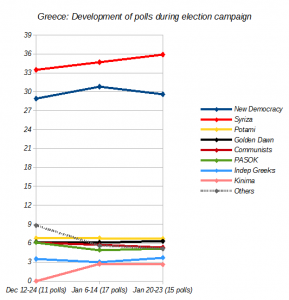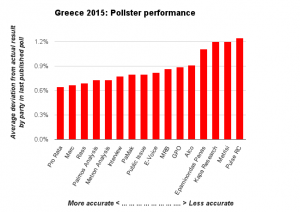It’s election day in Greece and the campaign will have been one of the shortest Europe’s seen in some while: it’s just 27 days ago, on 29 December, that parliament failed to elect a new president in the last of three votes, which triggered these new elections. Politicians scrambled to launch their campaigns, and former Prime Minister George Papandreou even still quickly founded a new party. “Few election campaigns have been as bitter or polarised as this,” the Guardian reported. And yet, all the sound and fury caused remarkably small changes in political preferences.
In particular, with all eyes trained on two main parties fighting for high stakes, you might expect the electorate to gravitate towards them, abandoning smaller parties that get neglected in the media coverage. This would seem especially likely in Greece because of the quirk in its election system, which awards the largest party a bonus 50 seats, making sure it will at least get close to a parliamentary majority. Some of this trend did indeed play out in Greece, but more so in the months prior to the election campaign. Over the second half of last year, both the governing New Democracy party and main opposition party Syriza steadily won over ever more voters, taking Syriza from 29% to over 33% and New Democracy from 24% to 29%. At some point Syriza’s average lead in the polls stretched out to almost 7%, then it shrank again to just over 4%. But by the time the actual election campaign rolled around, despite polls showing a large share of the population still undecided, their respective positions and those of most of the smaller parties evened out. That’s illustrated in this table, which shows a polling average drawn from the most recent poll from each pollster within the given time period:*
|
Dec 12-24
(11 polls) |
Jan 20-23
(15 polls) |
|
| New Democracy |
28,9 |
29,6 |
0,7 |
| Syriza |
33,5 |
35,9 |
2,4 |
| Potami |
6,8 |
6,7 |
-0,1 |
| Golden Dawn |
6,2 |
6,3 |
0,1 |
| Communists |
6,1 |
5,3 |
-0,8 |
| PASOK |
6,1 |
5,1 |
-1 |
| Indep Greeks |
3,5 |
3,7 |
0,2 |
| Kinima |
0 |
2,6 |
2,6 |
| Others |
8,8 |
5,1 |
-3,7 |
* If a pollster published two polls within the period, only the last one is counted; dates reflect the mid-point of when the polls were being conducted where available, not the day of publication.
Syriza netted another 2.4%, which is a decent achievement in the light of the government’s attempts to instill fear and panic over a possible Syriza take-over, but no sea change. Papandreou’s new party didn’t make much of a dent, stalling at 2.6%. The very smallest parties, those which polled under the system’s three percent electoral threshold, lost a lot of ground, but all the other remained roughly stable, with only the communist KKE and the center-left PASOK party losing a percentage point.
In the interest of polling hygiene, you may want to compare only those polls which were in the field during both time periods, in order to avoid the difference between the two periods reflecting ‘house effects’ of the pollsters rather than actual changes in public opinion. The data are very similar though:
|
Dec 12-24
(11 polls) |
Jan 20-23
(11 polls) |
|
| ND |
28,9 |
29,4 |
0,5 |
| Syriza |
33,5 |
36,1 |
2,6 |
| Potami |
6,8 |
6,8 |
0,0 |
| Golden Dawn |
6,2 |
6,3 |
0,1 |
| KKE |
6,1 |
5,3 |
-0,8 |
| PASOK |
6,1 |
5,0 |
-1,1 |
| Indep Greeks |
3,5 |
3,7 |
0,2 |
| Kinima |
0,0 |
2,6 |
2,6 |
| Others |
8,8 |
5,1 |
-3,7 |
That doesn’t mean there weren’t some interesting dynamics during the campaign though. In fact, it seems to have reached a tipping point about half way through. Here’s the same data as above, including all pollsters, but for three different periods, including a time period mid-way during the campaign:
|
Dec 12-24
(11 polls) |
Jan 6-14
(17 polls) |
|
Jan 20-23
(15 polls) |
|
| New Democracy |
28,9 |
30,8 |
1,9 |
29,6 |
-1,2 |
| Syriza |
33,5 |
34,7 |
1,2 |
35,9 |
1,2 |
| Potami |
6,8 |
6,8 |
0,0 |
6,7 |
-0,1 |
| Golden Dawn |
6,2 |
6,1 |
-0,1 |
6,3 |
0,2 |
| Communists |
6,1 |
5,7 |
-0,4 |
5,3 |
-0,4 |
| PASOK |
6,1 |
4,9 |
-1,2 |
5,1 |
0,2 |
| Indep Greeks |
3,5 |
3,0 |
-0,5 |
3,7 |
0,7 |
| Kinima |
0 |
2,7 |
2,7 |
2,6 |
-0,1 |
| Others |
8,8 |
5,6 |
-3,2 |
5,1 |
-0,5 |
Here’s the chart to that latest set of data – click to enlarge.

The polling average from three periods: the two weeks before the election campaign started; an eight-day window halfway through the campaign; and the last four days of polling.
In the first week or two of the campaign, we still see a continuation of the trend from the previous half a year: both New Democracy and Syriza gain some additional ground, at the expense of especially the “others” category of smallest parties. In addition, the emergence of Papandreou’s splinter party predictably hurt his old party, PASOK.
But in the last week or two of the campaign, New Democracy suddenly started slipping away, first almost imperceptibly, and with greater urgency the closer the elections came. In the couple of days, four different pollsters have seen ND numbers that are 2-4% lower than they were earlier this month. Syriza, on the other hand, kept on its incremental growth, and now its average lead in the polls is back up to over 6%. The Independent Greeks, a right-wing, anti-bailout party, seemed to benefit as well, rebounding a bit from its perilous position near the threshold line.
Narrowing the selection of polls down to only those pollsters which were in the field during each of these three periods doesn’t change much about the pattern:
|
Dec 12-24
(11 polls) |
Jan 6-14
(11 polls) |
|
Jan 20-23
(11 polls) |
|
| ND |
28,9 |
30,8 |
1,9 |
29,4 |
-1,4 |
| Syriza |
33,5 |
34,7 |
1,2 |
36,1 |
1,4 |
| Potami |
6,8 |
6,8 |
0,0 |
6,8 |
0,0 |
| Golden Dawn |
6,2 |
6,1 |
-0,1 |
6,3 |
0,2 |
| KKE |
6,1 |
5,7 |
-0,4 |
5,3 |
-0,4 |
| PASOK |
6,1 |
4,9 |
-1,2 |
5,0 |
0,1 |
| Indep Greeks |
3,5 |
3,0 |
-0,5 |
3,7 |
0,7 |
| Kinima |
0 |
2,7 |
2,7 |
2,6 |
-0,1 |
| Others |
8,8 |
5,6 |
-3,2 |
5,1 |
-0,5 |
Now, all we can do is wait until the polling stations close and we can see how far off the polls might have been!


 There are two pollsters that have done more than one poll within this timeframe: Gallup and Rasmussen.
There are two pollsters that have done more than one poll within this timeframe: Gallup and Rasmussen. Rasmussen asked: “Do you favor or oppose the economic recovery package proposed by Barack Obama and the Congressional Democrats?” It found strikingly different results.
Rasmussen asked: “Do you favor or oppose the economic recovery package proposed by Barack Obama and the Congressional Democrats?” It found strikingly different results. Three other pollsters asked a variation of the same question at some point in these last two and a half weeks.
Three other pollsters asked a variation of the same question at some point in these last two and a half weeks. Then there’s the question of strategy. I already linked to Josh Marshall’s
Then there’s the question of strategy. I already linked to Josh Marshall’s 




